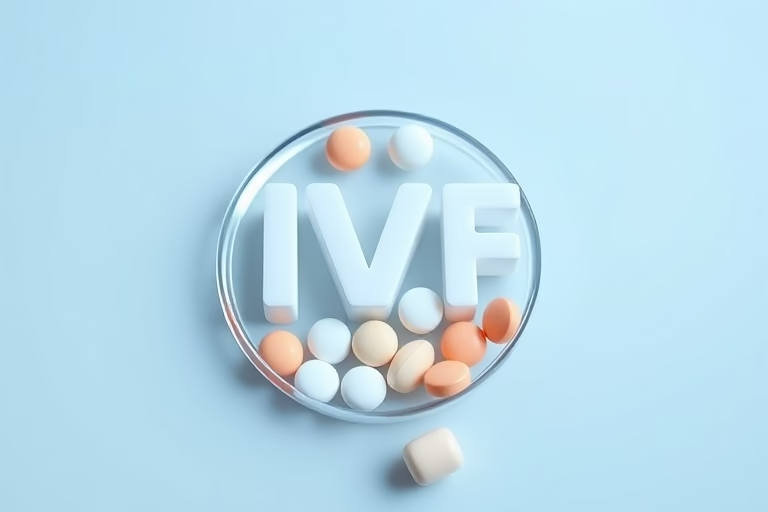In this article, we will be talking about IVF meds, which play an important role in assisted reproductive technology. IVF, or in vitro fertilization, is a process that helps individuals and couples conceive a child when they experience fertility issues. This can include a variety of factors such as age, hormonal imbalances, or health conditions that affect reproductive systems. IVF involves several steps, including hormone therapy, egg retrieval, fertilization, embryo culture, and embryo transfer. The medications used throughout this process are critical as they help manage hormones and stimulate egg production, ultimately increasing the chances of successful conception. Understanding IVF meds is essential for anyone considering this pathway to parenthood.
IVF medications can be broadly categorized into two types: contraceptives and stimulants. Contraceptives are often used to regulate the menstrual cycle and prepare the ovaries, while stimulants help promote the development of multiple eggs during the IVF cycle. The specific medications vary based on individual needs, and fertility specialists will prescribe the appropriate regimen based on each unique situation.
Understanding IVF Medications
IVF medications play a crucial role in helping couples conceive. These medications can include hormone injections and oral medications that either stimulate the ovaries or prepare the body for embryo transfer. Understanding how these medications work can be empowering and help individuals navigate their IVF journey more easily.
Hormonal medications like gonadotropins stimulate the ovaries to produce multiple eggs. This is essential as the IVF process typically requires more than one egg to increase the likelihood of successful fertilization. Medications like FSH (follicle-stimulating hormone) and LH (luteinizing hormone) are common examples. They are usually injected daily during the stimulation phase.
Contraceptive pills may also be prescribed to patients before starting hormone injections. These pills help regulate the menstrual cycle and suppress the natural hormonal signals from the brain. This allows doctors to have better control over the ovarian stimulation process.
Each IVF treatment may require a unique combination of medications to address patient-specific factors like hormone levels and the body’s response to treatment. Consulting closely with a fertility specialist is vital to determine the best medication regimen.
Types of IVF Medications
There are several categories of IVF medications, and understanding them can help individuals prepare for their IVF cycle. Here are the main types:
Knowing the different types of medications can help throughout the IVF treatment cycle. Each medication has its specific role and the appropriate ones will be prescribed based on individual circumstances.
Side Effects of IVF Medications
Like any medical treatment, IVF medications can have side effects. It’s important to be aware of these so you can manage them effectively. Common side effects may include:
If you experience side effects that concern you, contact your healthcare provider. It’s crucial to monitor your body’s response to any medication.
Timing and Administration of IVF Medications
Timing is everything when it comes to IVF medications. Healthcare providers will outline a specific schedule for administration. Keeping a detailed calendar or reminder system can help ensure that no doses are missed. Most of the medications in the stimulation phase are delivered via injection.
It is critical to follow the instructions given by your physician. Dosages may vary based on your hormone levels or response to treatment. Regular monitoring through blood tests and ultrasound will guide adjustments to your regimen. Adhering to the prescribed schedule maintains optimum hormone levels and egg development, improving overall success rates.
Cost of IVF Medications
The cost of IVF medications can be significant, depending on the type and dosage required. Most insurance policies have varying degrees of coverage for fertility medications, so understanding your plan will help. The average cost for hormone medications can be anywhere from $2,000 to $5,000 per cycle.
Additionally, some people may require specialty medications that can increase costs. It’s advisable to discuss financial options with your fertility clinic and explore any financial assistance programs they may offer. Understanding this aspect will help you budget better and reduce the stress associated with treatment.
IVF Medications and Emotional Wellness
The IVF process can take an emotional toll on individuals and couples. The medications can contribute to fluctuations in mood and emotional well-being. It is vital to prioritize mental health during this journey.
Consider engaging with support groups, therapy, or counseling services designed for those navigating fertility challenges. Building a support network of friends, family, or online communities can offer encouragement and understanding during this emotionally charged experience.
Availability and Accessibility of IVF Medications
Access to IVF medications may vary depending on your geographical location and healthcare system. In urban areas, pharmacies often carry a range of fertility drugs, while rural locations may have limited access.
It’s advisable to plan ahead and coordinate with your fertility clinic when it comes to sourcing medications. Providing your pharmacy with a prescription ahead of time can save valuable time and stress. Online pharmacies may also offer more options and competitive pricing, but ensure they are reputable.
Final Thoughts
IVF medications play a crucial role in the process of achieving pregnancy for many couples and individuals facing infertility challenges. Understanding the types of medications available, their effects, and how to administer them is essential for successful treatment. Knowledge about the potential side effects and managing emotional health is equally important. Financial implications should also be discussed, ensuring that individuals can adequately prepare for the costs involved in IVF.
It is always best to maintain open communication with your healthcare providers, who can guide you through the process, help you adjust medications as necessary, and make sure you are on the right track. Being informed, cautious, and proactive in managing your treatment can significantly enhance the chances of achieving your dream of parenthood. Whether you are at the beginning of your journey or are about to undergo your IVF cycle, being prepared is key.
Frequently Asked Questions
Further Reading
What Type of Psychotherapy Is Best for Anxiety?






